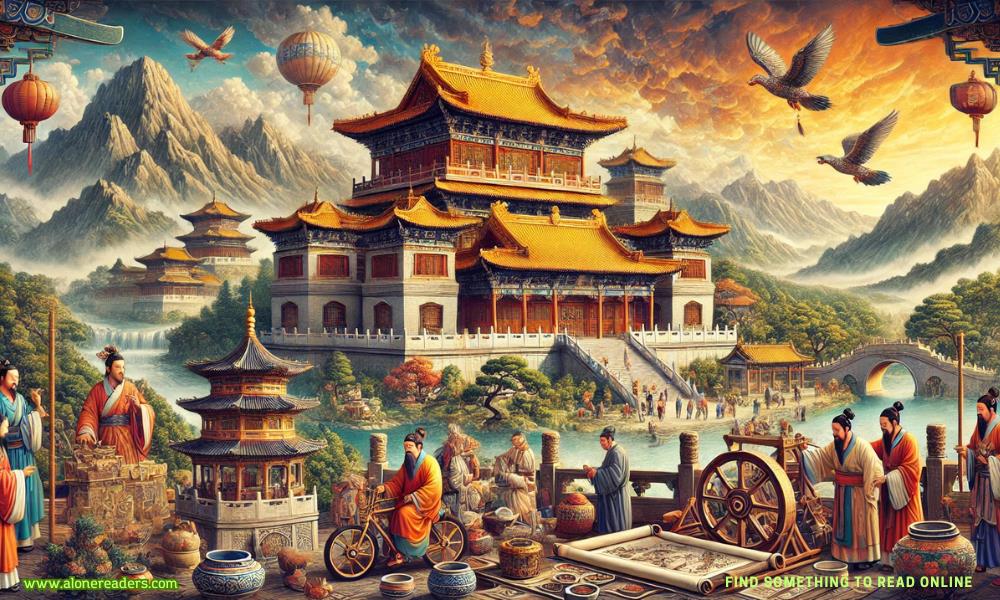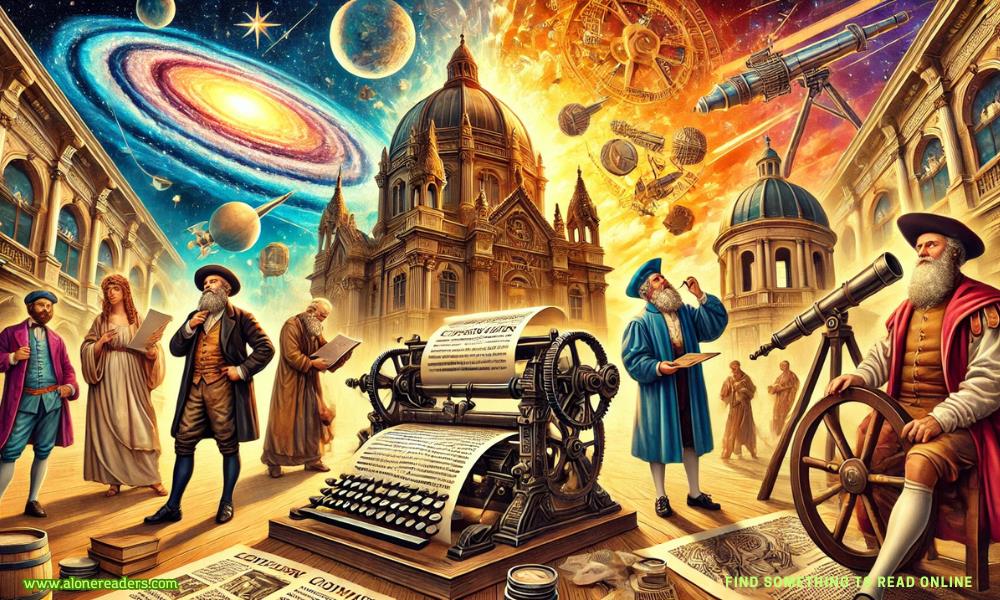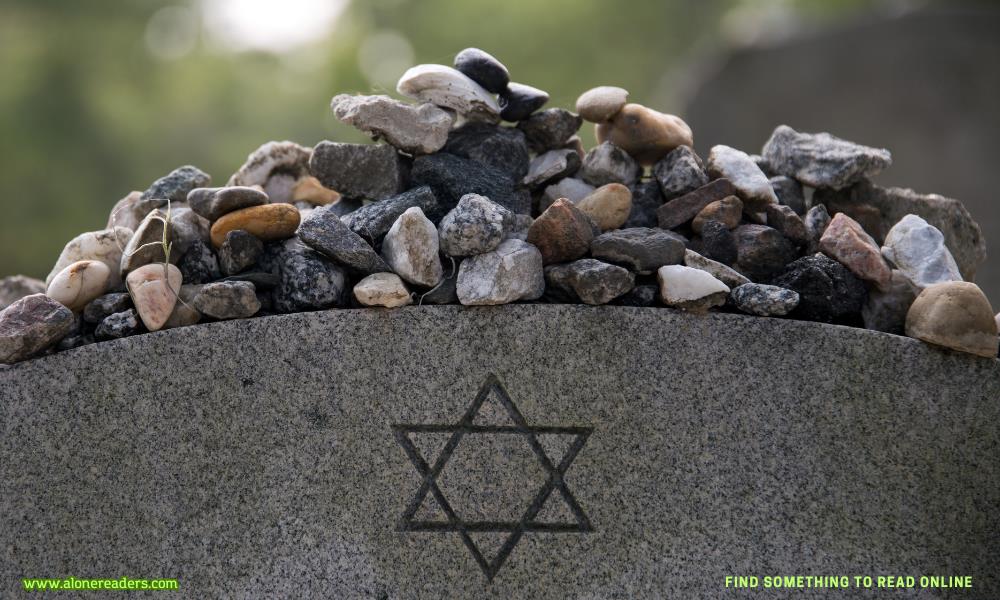Page 1 of Dragonquest (Dragonriders of Pern 2)
Prelude
RUKBAT, in the Sagittarian Sector, was a golden G-type star. It had five planets, two asteroid belts, and a stray planet it had attracted and held in recent millennia. When men first settled on Rukbat’s third world and called it Pern, they had taken little notice of the stranger planet, swinging around its adopted primary in a wildly erratic elliptical orbit. For two generations, the colonists gave the bright red star little thought—until the desperate path of the wanderer brought it close to its stepsister at perihelion.
When such aspects were harmonious and not distorted by conjunctions with other planets in the system, the indigenous life of the wanderer sought to bridge the space gap to the more temperate and hospitable planet.
The initial losses the colonists suffered were staggering, and it was during the subsequent long struggle to survive and combat this menace dropping through Pern’s skies like silver threads that Pern’s tenuous contact with the mother planet was broken.
To control the incursions of the dreadful Threads (for the Pernese had cannibalized their transport ships early on and abandoned such technological sophistication as was irrelevant to this pastoral planet), the resourceful men embarked on a long-term plan. The first phase involved breeding a highly specialized variety of a life-form indigenous to their new world. Men and women with high empathy ratings and some innate telepathic ability were trained to use and preserve these unusual animals. The “dragons” (named for the mythical Terran beast they resembled) had two extremely useful characteristics: they could get from one place to another instantly and, after chewing a phosphine-bearing rock, they could emit a flaming gas. As the dragons could fly, they’d be able to char Thread mid-air, yet escape its worst ravages themselves. It took generations to develop to the full the use of this first phase. The second phase of the proposed defense against the spore incursions would take longer to mature. For Thread, a space-traveling mycorrhizoid spore, devoured organic matter with mindless voracity and, once grounded, burrowed and proliferated with terrifying speed.
The originators of the two-stage defense program did not compensate sufficiently for chance nor for the psychological effect of visible extermination of this avid foe. For it was psychologically reassuring and deeply satisfying to the endangered Pernese to see the menace charred to impotence in mid-air. Also, the southern continent, where the second phase was initiated, proved untenable and the entire colony was moved to the northern continent to seek refuge from the Threads in the natural caves of the northern mountain ranges. The significance of the southern hemisphere lost meaning in the immediate struggle to establish new settlements in the north. Recollections of Earth receded further from Pernese history with each successive generation until memory of their origins degenerated past legend or myth and into oblivion.
The original Fort constructed in the eastern face of the great West Mountain range soon grew too small to hold the colonists. Another settlement was started slightly to the north, by a great lake conveniently nestled near a cave-filled cliff. Ruatha Hold, too, became overcrowded in a few generations.
Since the Red Star rose in the East, it was decided to start a holding in the eastern mountains, provided suitable accommodations could be found. Suitable accommodations now meant caves, for only solid rock and metal (of which Pern was in distressingly light supply) were impervious to the burning score of Thread.
The winged, tailed, fiery-breathed dragons had now been bred to a size which required more space than the cliffside Holds could provide. The ancient cave-pocked cones of extinct volcanoes, one high above the first Fort, the other in the Benden mountains, proved to be adequate, needing only a few improvements to be made habitable. However, such projects took the last of the fuel for the great stonecutters (which had been programmed for only diffident mining operations, not wholesale cliff excavations), and subsequent holds and weyrs were hand-hewn.
The dragons and the riders in their high places and the people in their caves went about their separate tasks and each developed habits that became custom, which solidified into traditions as incontrovertible as law.
Then came an interval—of two hundred Turns of the planet Pern around its primary—when the Red Star was at the other end of its erratic orbit, a frozen, lonely captive. No Thread fell on Pern’s soil. The inhabitants began to enjoy life as they had thought to find it when they first landed on the lovely planet. They erased the depredations of Thread and grew crops, planted orchards, thought of reforestry for the slopes denuded by Thread. They could even forget that they had been in grave danger of extinction. Then the Threads returned for another orbit around the lush planet—fifty years of danger from the skies—and the Pernese again thanked their ancestors, now many generations removed, for providing the dragons who seared the dropping Thread mid-air with their fiery breath.
Dragonkind, too, had prospered during that interval; had settled in four other locations, following the master plan of interim defense. Men managed to forget completely that there had been a secondary measure against Thread.
By the third Pass of the Red Star, a complicated sociopolitical-economic structure had been developed to deal with this recurrent evil. The six Weyrs, as the old volcanic habitations of the dragonfolk were called, pledged themselves to protect all Pern, each Weyr having a geographical section of the northern continent literally under its wings. The rest of the population would tithe to support the Weyrs since these fighters, the dragonmen, did not have any arable land in their volcanic homes, nor could they take time away from the nurture of dragonkind to learn other trades during peacetime, nor time away from protecting the planet during Passes.
Settlements, called Holds, developed wherever natural caves were found; some, of course, more extensive or strategically placed than others. It took a strong man to hold frantic, terrified people in control during Thread attacks; it took wise administration to conserve victuals when nothing could safely be grown, and extraordinary measures to control population and keep it useful and healthy until such time as the menace had passed. Men with special skills in metalworking, animal breeding, farming, fishing, mining
(such as there was), weaving, formed Crafthalls in each large Hold and looked to one Mastercrafthall where the precepts of their craft were taught, and craft skills preserved and guarded from one generation to another. So that one Lord Holder could not deny the products of the Crafthall situated in his Hold to others of the planet, the Crafts were decreed independent of a Hold affiliation, each Craftmaster of a hall owing allegiance to the Master of that particular craft (an elected office based on proficiency and administrative ability). The Mastercraftsman was responsible for the output of his halls, the distribution, fair and unprejudiced, of all craft products on a planetary rather than parochial basis.
Certain rights and privileges accrued to the different leaders of Holds and Masters of Crafts, and naturally, to the dragonriders to whom all Pern looked for protection during Threadfalls.
The Red Star would swing inexorably close to Pern, but it would also Pass again, and life could settle into a less frenzied pattern. Occasionally, the conjunction of Rukbat’s natural five satellites would prevent the Red Star from passing close enough to Pern to drop its fearful spores. Sometimes, though, as siblings will, Pern’s sister planets seemed to draw the Red Star closer still and Thread rained relentlessly on the unfortunate victim. Fear creates fanatics and the Pernese were no exception. Only the dragonmen could save Pern, and their position in the structure of the planet became inviolable.
Mankind has a history of forgetting the unpleasant, the undesirable. By ignoring its existence, it can make the source of past Terror disappear. And the Red Star did not pass close enough to Pern to drop its Threads. The people prospered and multiplied, spreading out across the rich land, carving more holds out of solid rock, and so busy with their pursuits, that they did not realize that there were only a few dragons in the skies, and only one Weyr of dragonriders left on Pern. The Red Star wasn’t due back for a long, long while. Why worry about such distant possibilities? In five generations or so, the descendants of the heroic dragonmen fell into disfavor. The legends of past braveries and the very reason for their existence fell into disrepute.
When, in the course of natural forces, the Red Star began to spin closer to Pern, winking with a baleful red eye on its intended, ancient victim, one man, F’lar, rider of the bronze dragon, Mnementh, believed that the ancient tales had truth in them. His half-brother, F’nor, rider of brown Canth, listened to his arguments and found belief in them more exciting than the dull ways of the lone Weyr of Pern. When the last golden egg of a dying queen dragon lay hardening on the Benden Weyr Hatching Ground, F’lar and F’nor seized this opportunity to gain control of the Weyr. Searching through Ruatha Hold for a strong woman to ride the soon-to-be hatched young queen, F’lar and F’nor discovered Lessa, the only surviving member of the proud Bloodline of Ruatha Hold. She Impressed young Ramoth, the new queen, and became Weyrwoman of Benden Weyr. When F’lar’s bronze Mnementh flew the young queen in her first mating, F’lar became Weyrleader of Pern’s remaining dragonmen. The three riders, F’lar, Lessa and F’nor forced the Lord Holders and Craftsmen to recognize their imminent danger and prepare the almost defenseless planet against Thread. But it was distressingly obvious that the scant two hundred dragons of Benden Weyr could not defend the sprawling settlements. Six full Weyrs had been needed in the olden days when the settled land had been much smaller. In learning to direct her queen dragon between one place and another, Lessa discovered that dragons could teleport between time as well. Risking her life as well as Pern’s only mature queen dragon, Lessa and Ramoth went back in time, four hundred Turns, before the mysterious disappearance of the other five Weyrs, just after the Last Pass of the Red Star had been completed.
The five Weyrs, seeing only the decline of their prestige and bored with inactivity after a lifetime of exciting combat, agreed to help Lessa’s Weyr and came forward to her Turn.
Seven Turns have now passed since that triumphant journey forward, and the initial gratitude of the Holds and Crafts to the rescuing Oldtime Weyrs has faded and soured. And the Oldtimers themselves do not like the Pern in which they are now living. Four hundred Turns brought too many subtle changes, and dissensions mount.
CHAPTER I
Morning at Mastercrafthall, Fort Hold
Several Afternoons Later at Benden Weyr
Midmorning (Telgar Time) at
Mastersmithcrafthall, Telgar Hold
HOW TO BEGIN? mused Robinton, the Masterharper of Pern.
He frowned thoughtfully down at the smoothed, moist sand in the shallow trays of his workdesk. His long face settled into deep-grooved lines and creases, and his eyes, usually snapping blue with inner amusement, were gray-shadowed with unusual gravity.
He fancied the sand begged to be violated with words and notes while he, Pern’s repository and glib dispenser of any ballad, saga or ditty, was inarticulate. Yet he had to construct a ballad for the upcoming wedding of Lord Asgenar of Lemos Hold to the half-sister of Lord Larad of Telgar Hold. Because of recent reports of unrest from his network of drummers and Harper journeymen, Robinton had decided to remind the guests on this auspicious occasion—for every Lord Holder and Craftmaster would be invited—of the debt they owed the dragonmen of Pern. As the subject of his ballad, he had decided to tell of the fantastic ride, between time itself, of Lessa, Weyrwoman of Benden Weyr on her great golden queen, Ramoth. The Lords and Craftsmen of Pern had been glad enough then for the arrival of dragonriders from the five ancient Weyrs from four hundred Turns in the past.
Yet how to reduce those fascinating, frantic days, those braveries, to a rhyme? Even the most stirring chords could not recapture the beat of the blood, the catch of breath, the chill of fear and the hopeless surge of hope of that first morning after Thread had fallen over Nerat Hold; when F’lar had rallied all the frightened Lords and Craftmasters at Benden Weyr and enlisted their enthusiastic aid.
It had not been just a sudden resurgence of forgotten loyalties that had prompted the Lords, but the all too real sense of disaster as they envisioned their prosperous acres blackened with the Thread they had dismissed as myth, of the thought of burrows of the lightning propagating parasites, of themselves walled up in the cliff-Holds behind thick metal doors and shutters. They’d been ready to promise F’lar their souls that day if he could protect them from Thread. And it was Lessa who had bought them that protection, almost with her life.
Robinton looked up from the sandtrays, his expression suddenly bleak.
“The sand of memory dries quickly,” he said softly, looking out across the settled valley toward the precipice that housed Fort Hold. There was one watchman on the fire ridges. There ought to be six, but it was planting time; Lord Holder Groghe of Fort Hold had everyone who could walk upright in the fields, even the gangs of children who were supposed to weed spring grass from stone interstices and pull moss from the walls. Last spring, Lord Groghe would not have neglected that duty no matter how many dragonlengths of land he wanted to put under seed.
Lord Groghe was undoubtedly out in the fields right now, prowling from one tract of land to another on one of those long-legged running beasts which the Masterherdsman Sograny was developing. Groghe of Fort Hold was indefatigable, his slightly protuberant blue eyes never missing an unpruned tree or a badly harrowed row. He was a burly man, with grizzled hair which he wore tied in a neat band. His complexion was florid, with a temper to match. But, if he pushed his holders, he pushed himself as well, demanding nothing of his people, his children nor his fosterlings that he was not able to do himself. If he was conservative in his thinking, it was because he knew his own limitations and felt secure in that knowledge.
Robinton pulled at his lower lip, wondering if Lord Groghe was an exception in his disregard for this traditional Hold duty of removing all greenery near habitations. Or was this Lord Groghe’s answer to Fort Weyr’s growing agitation over the immense forest lands of Fort Hold which the dragonriders ought to protect? The Weyrleader of Fort Weyr, T’ron, and his Weyrwoman, Mardra, had become less scrupulous a
bout checking to see that no Thread burrows had escaped their wing riders to fall on the lush forests. Yet Lord Groghe had been scrupulous in the matter of ground crews and flame-throwing equipment when Thread fell over his forests. He had a stable of runners spread out through the Hold in an efficient network so that if dragonriders were competent in flight, there was adequate ground coverage for any Thread that might elude the flaming breath of the airborne beasts.
But Robinton had heard ugly rumors of late, and not just from Fort Hold. Since he eventually heard every derogatory whisper and accusation uttered in Pern, he had learned to separate fact from spite, calumny from crime. Not basically an alarmist, because he’d found much sifted itself out in the course of time, Robinton was beginning to feel the stirrings of alarm in his soul.
The Masterharper slumped in his chair, staring out on the bright day, the fresh new green of the fields, the yellow blossoms on the fruit trees, the neat stone Holds that lined the road up to the main Hold, the cluster of artisans’ cotholds below the wide ramp up to the Great Outer Court of Fort Hold.
And if his suspicions were valid, what could he do? Write a scolding song? A satire? Robinton snorted. Lord Groghe was too literal a man to interpret satire and too righteous to take a scold. Furthermore, and Robinton pushed himself upright on his elbows, if Lord Groghe was neglectful, it was in protest at Weyr neglect of far greater magnitude. Robinton shuddered to think of Thread burrowing in the great stands of softwoods to the south.
He ought to sing his remonstrances to Mardra and T’ron as Weyrleaders—but that, too, would be vain effort. Mardra had soured lately. She ought to have sense enough to retire gracefully to a chair and let men seek her favors if T’ron no longer attracted her. To hear the Hold girls talk, T’ron was lusty enough. In fact, T’ron had better restrain himself. Lord Groghe didn’t take kindly to too many of his chattels bearing dragonseed.
- Praise Me: Princess by Jessa Kane
- Animal Instincts by Jenika Snow
- Captured By the Bratva by Ava Gray
- Devlin by Winter Sloane
- Cruel Honor by Ivy Davis
- Playing With Fire by Emily Hayes
- The Ballerina by Jade Marshall
- Frat House Fling by Stephanie Brother
- Use Me, Daddy by Sara Fields
- Snowy Secrets by Ajme Williams
- Fierce-Michael by Natalie Ann
- Forever His This Christmas by Rosa Mink
- Trust Me With Forever by Kayla Chase
- She's Got that Fire by Haley Travis
- Savage Mountain Man by Lilah Hart
- The Way You Hurt Me by Emm Darcy







